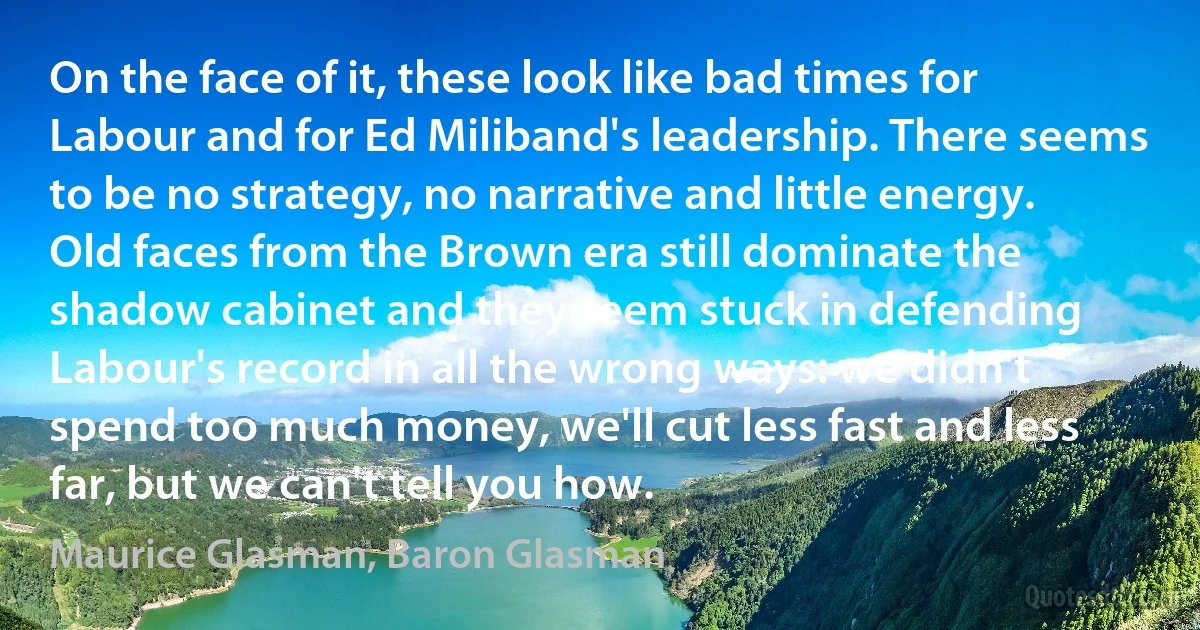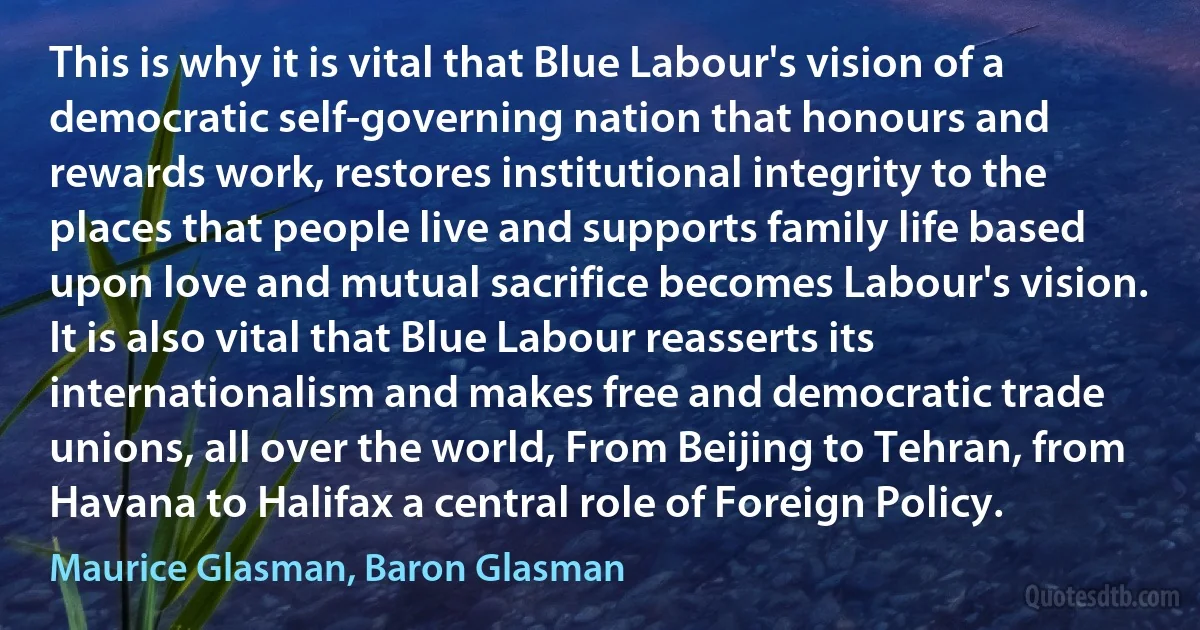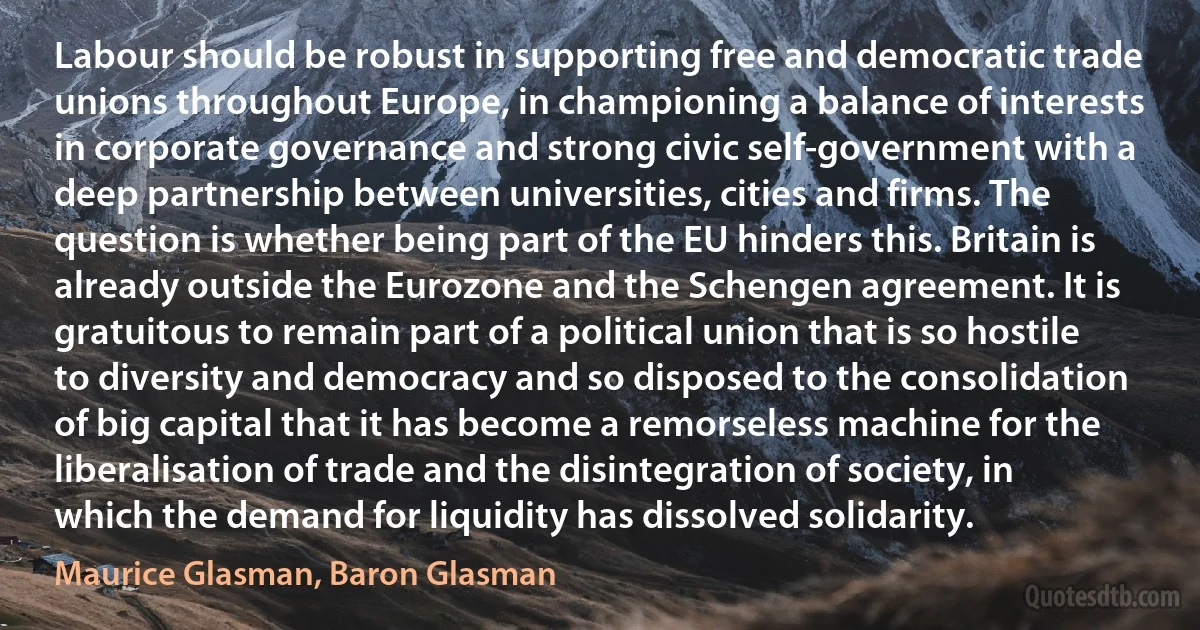Maurice Glasman, Baron Glasman quotes
This conference has a very weird atmosphere – it's a different atmosphere. It's an atmosphere of a superannuated student union. They've just stayed in the student union through a lifetime. Until we have the maturity and generosity to have a genuine understanding of New Labour our growth will be stunted. The present criminalisation and demonisation of Blair doesn't help us get to that place.

Maurice Glasman, Baron Glasman
Labour has always been a coalition between workerist and progressive elements, liberals and conservatives, mediated by socialism. It was held together by the belief that we are social beings who resist the domination of capital through democracy; and by the refusal to accept that human beings are a commodity or that our inheritance is exclusively monetary.

Maurice Glasman, Baron Glasman
It is perhaps a redeeming feature of the year that celebrity endorsements may be seen as the kiss of death to any political campaigning. The unanimous acclamation of Clinton by the famous and the lovey chorus for Remain were to no avail. It is better to build relationships and do politics with the poor rather than the rich.

Maurice Glasman, Baron Glasman
I am working with Unite in Salford to set up the Bank of Salford. It is going well. They have consolidated the credit unions, put money in, the city council will put their pay roll through it to stabilise the asset, the government are supporting it with advice and lowering entry requirements to become a bank that can lend to businesses as well as families. It will be bounded within Salford, there will be local residents on the board as well as institutions, but Unite cannot do it on their own. There needs to be a partnership between the Church and labour that can put some constraint on capital without relying on the state. Relational accountability and democratic governance are key to this. That is how the old bones will walk again, by renewing a commitment to the common good in action. It's a great thing to do.

Maurice Glasman, Baron Glasman
The list of characteristics of the good life suggested by Lord Skidelsky include neither work nor politics and that indicates that there is a problem with understanding power. Part of a good life is not to be dominated by the rich and the powerful and that can only be done through asserting the necessity of recognising labour as a value so that the people who do it are treated humanely and that involves the other thing that defines human beings, they can get together and change things through the power of association. Politics is part of the good life too although I can tell you it doesn't always feel that way.

Maurice Glasman, Baron Glasman
We've got to reinterrogate our relationship with the EU on the movement of labour. The EU has gone from being a sort of pig farm subsidised bloc to the free movement of labour and capital. Britain is not an outpost of the UN. We have to put the people in this country first.

Maurice Glasman, Baron Glasman
I realised that over a few years through these London Citizens campaigns we'd developed a more radical political economy than the Labour Party. For me, it was catch up, catch up, catch up. I was always a Labour, secular, left-winger and this was all new. One of the big lessons for me was which people would turn up. If the mosque said 50 people, the Catholic church says 50 people, the local black church says 50 people, they turn up. When the trade unions said 50 people, no-one turns up. So suddenly the crisis of secular institutions and their reproduction came to me.

Maurice Glasman, Baron Glasman
We begin with the people and they have to define the position. So relationships first, then build power among those people where they agree. So, based on support for thing like regional banks, interest rate cap, living wage, a very, very different kind of agenda. The words we don't use much are equality, diversity, accessibility, inclusivity, because that's not where people are. We work on living wage, anti-usury, regional banks, vocational colleges, workers on boards. And it's a real change in the way that the party works.

Maurice Glasman, Baron Glasman
Post-war Labour ideology in Britain has reached the end of the road. We tried the state (1945), we tried the market (1997), then we tried them both together (2007) and Britain is still not generating value in anything other than financial services and high end university teaching and research. Paradoxically, both sectors are protected by the two most ancient, and most democratic self-governing institutions left in the country. Cambridge University on the one side and the City of London Corporation on the other. It is time for our socialist tradition to rediscover the social.

Maurice Glasman, Baron Glasman
Capital has just become completely disconnected from the people. Labour was born in the world to resist the domination of capital. That's our thing. So we say that five percent of the bailout should be used to recapitalise local banks. It's our money anyway. Those local banks should only lend in the area that they're in. Germany's a very successful, a very, very successful example of how this can work.

Maurice Glasman, Baron Glasman
Labour freed up enormous amounts of money for third sector initiatives, which was magnificent. But it also became too statist. Charities became very reliant on state funding to pursue their agendas, so charities became distant from local communities. Despite all the funding, there was no transformation of the lives of excluded poor people. The greatest gift of the big society will be the renewal of the Labour Party. If it takes civil society and people power seriously, and listens to people who have a following in their own communities, it will find that it has reconnected with its own political traditions.

Maurice Glasman, Baron Glasman
One massive issue is that [in government] we did not promote regional flourishing. To put it bluntly there was not enough private sector growth in the north east, the north west, the midlands and south west, and the south east was financially driven which had its own problems. I share your disposition about capitalism, but I look at Tesco and think, it's cheap, healthy food, and it has transformed the lives of the poor. Yet we hate them. When London Citizens did a living wage campaign against Tesco what we found was enormous middle class loathing while the working class had a love for Tesco. They love the fact that the food was fresh and cheap and the environment was safe. And when they bought a small package of mince they didn't have a butcher going, ‘Ah, tough week, eh?' They didn't feel humiliated. That's just a tough example I put out there to say we've got to build alliances and relationships with the powers. We've got to look at how we can get Tesco to foster regional diversity.

Maurice Glasman, Baron Glasman
And what is going on is that the SPD (Social Democratic Party of Germany) has lost the trust of working class German voters, is overwhelmingly a party of the public sector, social science graduates and ethnic minorities and won barely more than a quarter of the vote. It has moved its concerns from those of the internal governance of the political economy to a political and legal orientation that requires the passing of laws, external regulation and redistribution. It has not seriously defended the internal virtues of its economic system, preferring to stress external factors such a stimulus and taxation. Justice and rights rather than democracy and the good have come to define the position. I am strongly suggesting the party has become liberal rather than socialist and that is the fundamental problem.

Maurice Glasman, Baron Glasman
Blue Labour has complete disrespect for the managerialism of New Labour and has much more honour for the workforce. If you talk about schooling, we'd like to see parents have a third of the power, teachers have a third of the power and the funders – whether it's the state or local authority – a third of the power, and negotiate a common good. New Labour sought managerial solutions in the private sector and that's what led to the banking collapse; they sought managerial solutions in the public sector which led to the erosion of the public ethos – so we will put people first, relationships first and that's a very different thing.

Maurice Glasman, Baron Glasman
Among those who voted Brexit, there is still support for Parliament and its traditional sovereignty, for the monarchy, for the NHS, and for the Union. As the Copeland by-election showed, they prefer to vote Conservative rather than Ukip, and as the Stoke result indicates, many will grudgingly vote Labour rather than Ukip. What they wish to see is a democratic politics that represents their interests. If this is populism then it is of a muted English variety that wishes to see the renewal of national institutions and a recognition that family, place and work-the things that matter to them-matter to their rulers.

Maurice Glasman, Baron Glasman
The last thing I watched on telly with my mother, she died in very late 2008 in the middle of the financial crash, was Gordon Brown saying that it was the destiny of the Labour movement to save the global banking system. And that statement –‘the destiny of the Labour movement to save the global banking system'... I looked to my mum and the last movement she made, really, was to shake her head. You know, it may be the fate of the Labour movement but it can't be its destiny, that's just crazy. She just looked bewildered by that.

Maurice Glasman, Baron Glasman
The challenge for Labour is that there's huge support for working class, from mining communities, from northern working class communities for UKIP, which wouldn't be the case if they were a straightforward Thatcherite party. So an ability to engage with the rage and dispossession people feel is absolutely necessary for constructive politics. And how do you build a common good between locals and immigrants? How do you build a common good between north and south, between the small towns and cities? We're not thinking of the levels of abandonment that people feel, and UKIP express that.

Maurice Glasman, Baron Glasman
Unfortunately, the comments were misconstrued. I was saying that we needed to speak to the supporters of the EDL, not, as some people made out, that we should speak to the EDL itself. The idea that we should speak to upset, angry and dispossessed people, to try build a better life together, must be addressed and historically the Labour movement has been the vehicle to do this. It is a broad-based approach. Where there are mass outpourings of discontent, you have two choices, either you demonise them or you break them.

Maurice Glasman, Baron Glasman
Miliband has acted strategically in leading the changes required in the three areas over which he has control: party organisation, the policy review, and his own leadership. In party terms, there is a far stronger emphasis on leadership development, and a greater role for organisers in strengthening and brokering the relationships necessary to re-establish Labour as a vital political force in people's daily lives. This is a neglected tradition, but the old bones are beginning to walk again. And it is not just an effective ground game: organising aligns campaigning with a better political position.

Maurice Glasman, Baron Glasman
The overriding paradox is that a democratic and vocational resistance to modernity, defined as the joint sovereignty of financial markets and public administration is the most efficient, competitive and sustainable modern position. The tragedy is that such a reasonable political position is unavailable within the mainstream of European politics, indeed there are those who argue that it would be illegal and an infringement of EU rules concerning competition.

Maurice Glasman, Baron Glasman
I was involved with organising migrant worker nannies, domestic workers, in New York State with the IAF. We flew them to a hotel, got them together, and got them to talk to each other about what their issues were. What was incredible was that out of those 300 nannies all of them were prepared to pay a not insubstantial part of their wages to join a union that could articulate their concerns. They were getting sexual harassment, exploitation. It only grew out of them meeting each other, they had to have that initial investment to get them together. They came from all over the world but what they found when they got together was they had the same issues. If people knew you could join a union, get on, and protect each other it would be transformative – we've got to find a way, to put it bluntly, of supporting good work. There needs to be a complete transformation of the language and agenda of unions.

Maurice Glasman, Baron Glasman
Maurice Glasman, Baron Glasman

Photo:
Wikimedia commons,
CC BY 3.0
Occupation: British Philosopher
Born: March 8, 1961
Quotes count: 48
Wikipedia: Maurice Glasman, Baron Glasman






